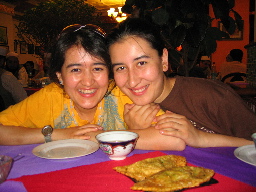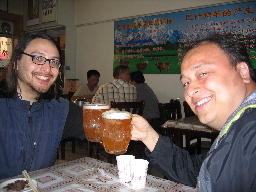
Sisters: Mahira and Rahila
David reads this current entry, Frisbee, aloud 5.4 MB
2005.06.06 Urumqi, China
 Sisters: Mahira and Rahila |
There's no particular reason I say that. There is no one thing I can isolate out, explaining what makes me so happy living here. Trying to examine it, I'm even less clear on why I should feel that way. I'm far from family in America. My progress with languages and calligraphy is steady, though slower than I'd like it to be. I'm not in love. I think it's just that I've achieved a level of contentment and comfort, having settled into Urumqi. My flat, friends, food--everything is good.
That's not to say every moment of each day is magical. One occasional nuisance I've found living here is that I get sick far more than anywhere else I've lived. (I presume this is due to the high level of pollution and low level of sanitation.)
I fell ill again last week: I spent three days without venturing out of the house. Most of that time I was either asleep or running to the bathroom. I'm not sure what brought it on. It might have been an intense game of Ultimate Frisbee I played the previous day. I spent a couple hours out on one of the fields at X.U., tossing the disc around with Uighur friends and a few other foreigners. The sun was strong, it was more running and physical activity than I'd attempted in years. I felt weary but fine in the hours after the game. By evening I knew I would be ill, by morning I knew I wouldn't be attending class for the rest of the week.
I did manage to make it to an interview with that department that was interested in me teaching English. Siddiqjan came along to play interpreter even though I could understand what was being said in the negotiations, all spoken in Uighur. I figured it would be to my advantage to play the mute foreigner.
They were interested in me starting immediately, and not teaching just four hours a week, but eight. An additional advantage was that they wanted me to teach on the main campus, requiring just a short walk from my apartment. I thought about it and figured that could be some decent money, so told them I'd be willing to revise my class schedule a bit in order to allow my hours to meld with theirs. However, they started with an extremely lowball offer of 60 RMB an hour. The base hourly rate made by any foreigner who shows up without credentials is 100 RMB per hour. I told them I expected at least 120 RMB per hour, given my background in education, fancy advanced degrees, bleah, bleah, bleah. Before leaving the office they worked themselves up to an hourly wage of 80 RMB. After I declined and exited the building they ran after me and asked if it wouldn't be possible to work for 90.
I knew this to be part of how negotiation is carried out in this country, but really didn't have the patience for it. Sure, they'd eventually arrive at the wage I insisted on. I just didn't feel like playing the game. I politely thanked them for their time and told them to please call if they could raise their offer. I don't really need the hours now and would rather begin when I don't have classes of my own to attend, anyway. If I do teach this autumn there are plenty of other places I could work. On top of that, I hope to take two longer trips this summer. I may have to return to Urumqi after the school year has already begun. I figure I may as well find the teaching position after I'm back from my travels.
With the weather at that perfect point of warm days and cool evenings, Frisbee has been keeping me active outside more often. Aside from the increasingly frequent Frisbee tossing, I've been playing a lot of other games with friends. Shamsiya, Rahila, and Nisagul are all fair competition for SET. A classmate from Germany, Friederike, has lent me a copy of Uno, which has become the current way to pass time with my friends. I've realized that maybe things haven't changed that much for me. I spent much of my senior year of high-school skipping class to play Frisbee, then meeting friends over card or word games in the evenings.
 Brothers: Ben and David drink mead |
I've been surprised how well many of my Uighur friends can toss the disc. The only Frisbees I've seen available around Urumqi tend to be small, cheap, and light. However, Rahila and her older sister Mahira, evidently played to some degree when growing up in Kashgar. They both love to get out and run around, and can hurl the disc with accuracy. Spending time getting to know this other sibling of Rahila's has been the opposite of the experience I had meeting her brother. I did go over to Rahila's parents' new flat last Monday for lunch, where we were introduced. Since then it's been an occasional get-together over a meal, Frisbee, or some card game. The majority of our conversation is in Uighur, though she lapses into English occasions that I can't comprehend.
I am somewhat wary (probably needlessly so): Mahira is at just the age where she needs to be married off. Lunch at her family's place went well, and I genuinely enjoyed talking with her father. However, her passing along a couple days ago that, "My parents thought you were a very nice boy," or her assessment that, "I think you are very interesting," gave me pause.
The topic of marriage has come up occasionally in my Uighur language courses and I've twice seen a chart drawn up on the classroom chalkboard delineating what an appropriate dowry is today. The correct sum depends on several factors including age, the size of the woman's hometown, and how much education she has. The chart showed a higher dowry as each factor increased, up to certain limits of education and age. The highest dowry would be for a woman of approximately 24 with a university education. However, graduate school or a doctoral degree yields a lower amount: evidently most local men are not interested in marrying a woman with equal or higher education than they themselves have. As to age, I think the cutoff was 27 or 28.
Mahira is 25 and practices as a medical doctor. Living as an unmarried woman in Xinjiang this means that her prospects have already started to decline.